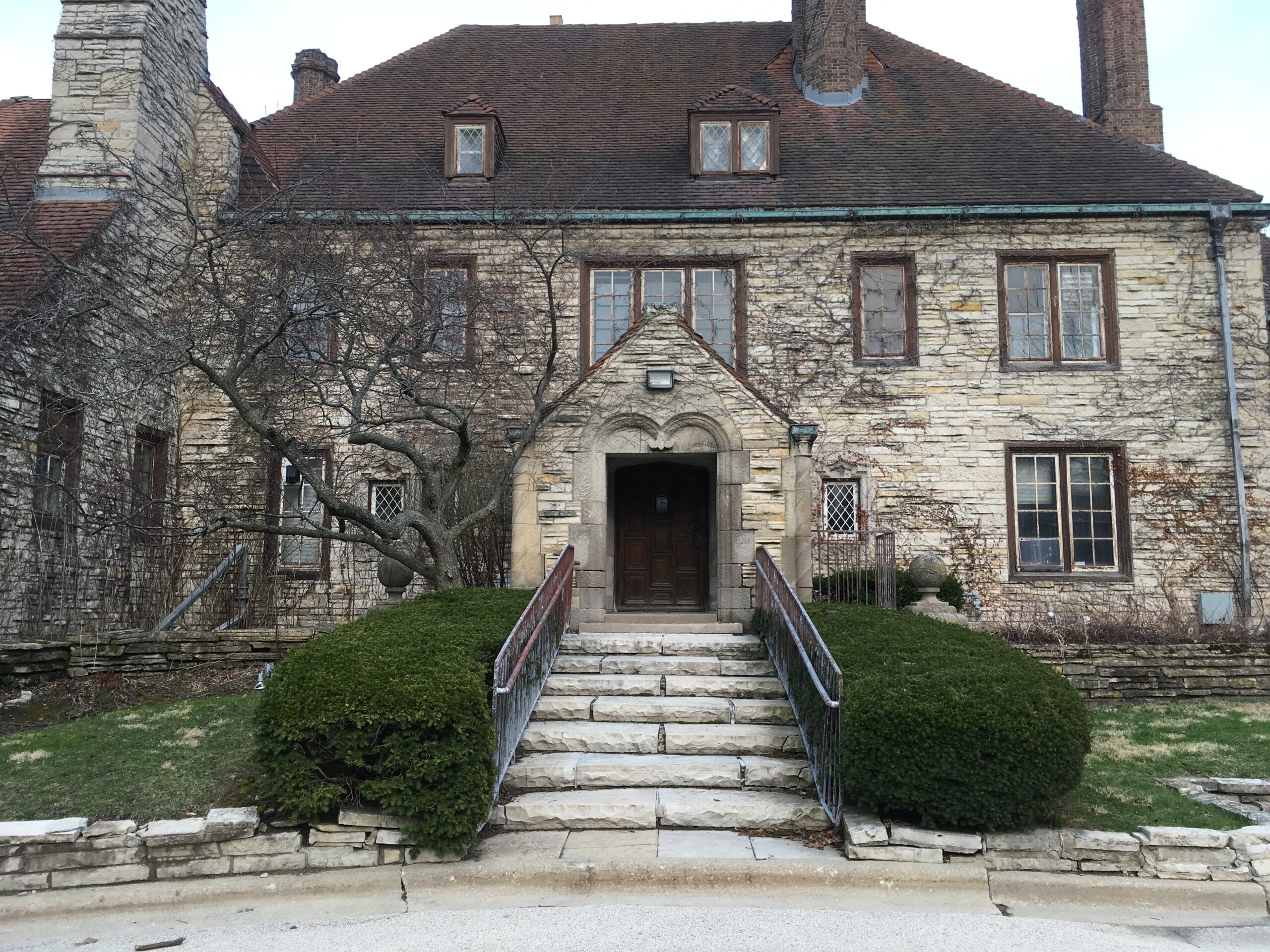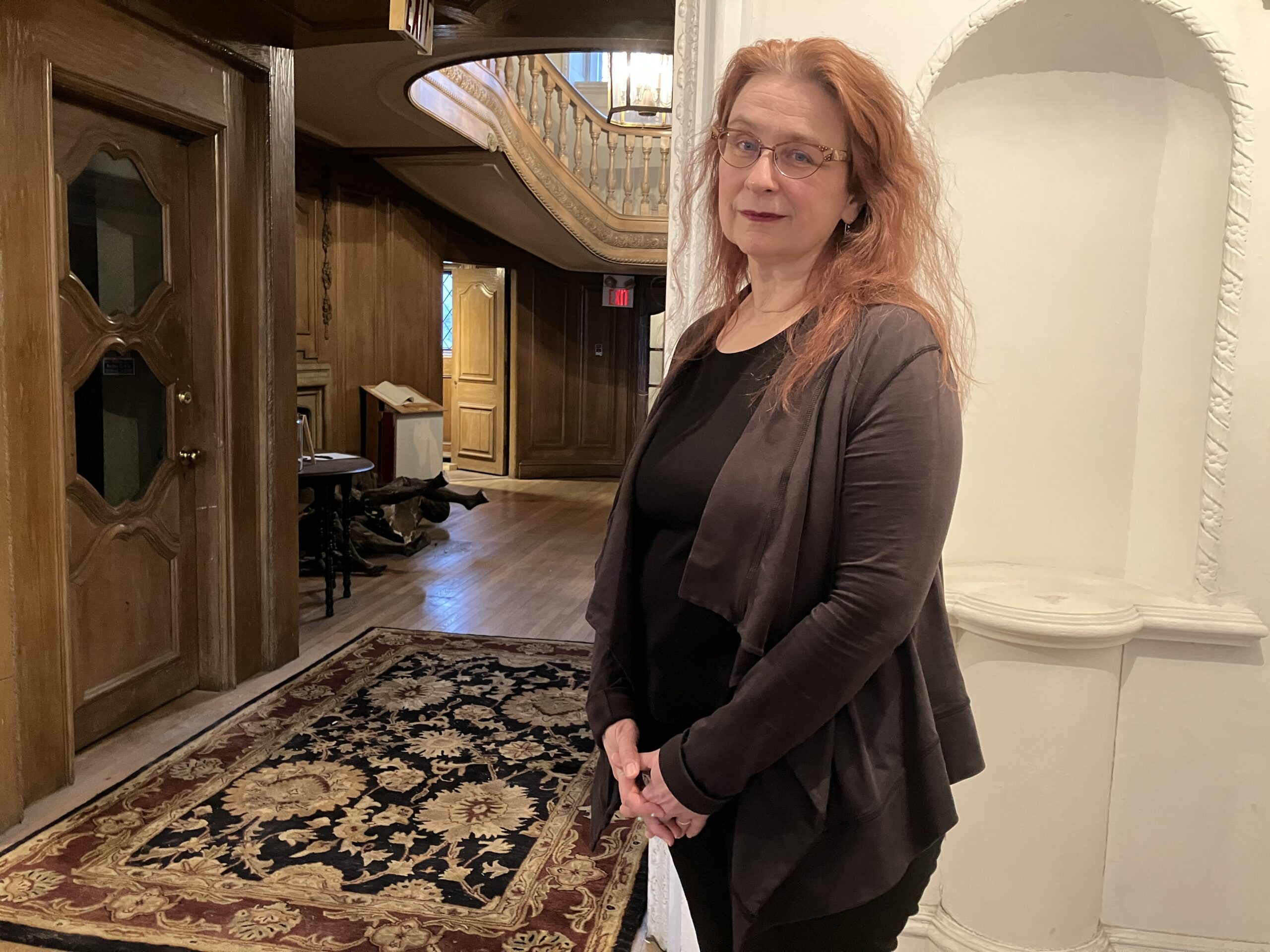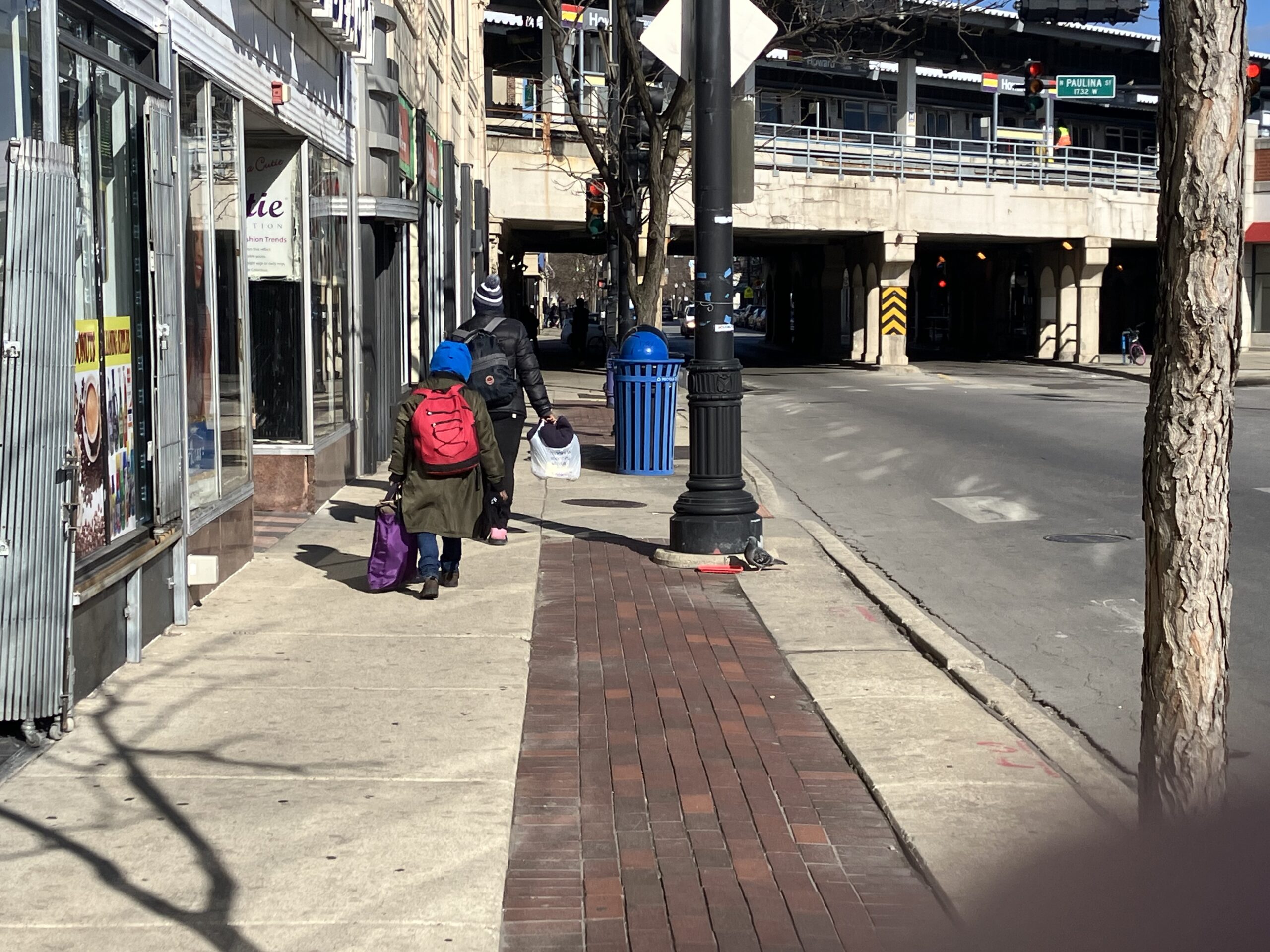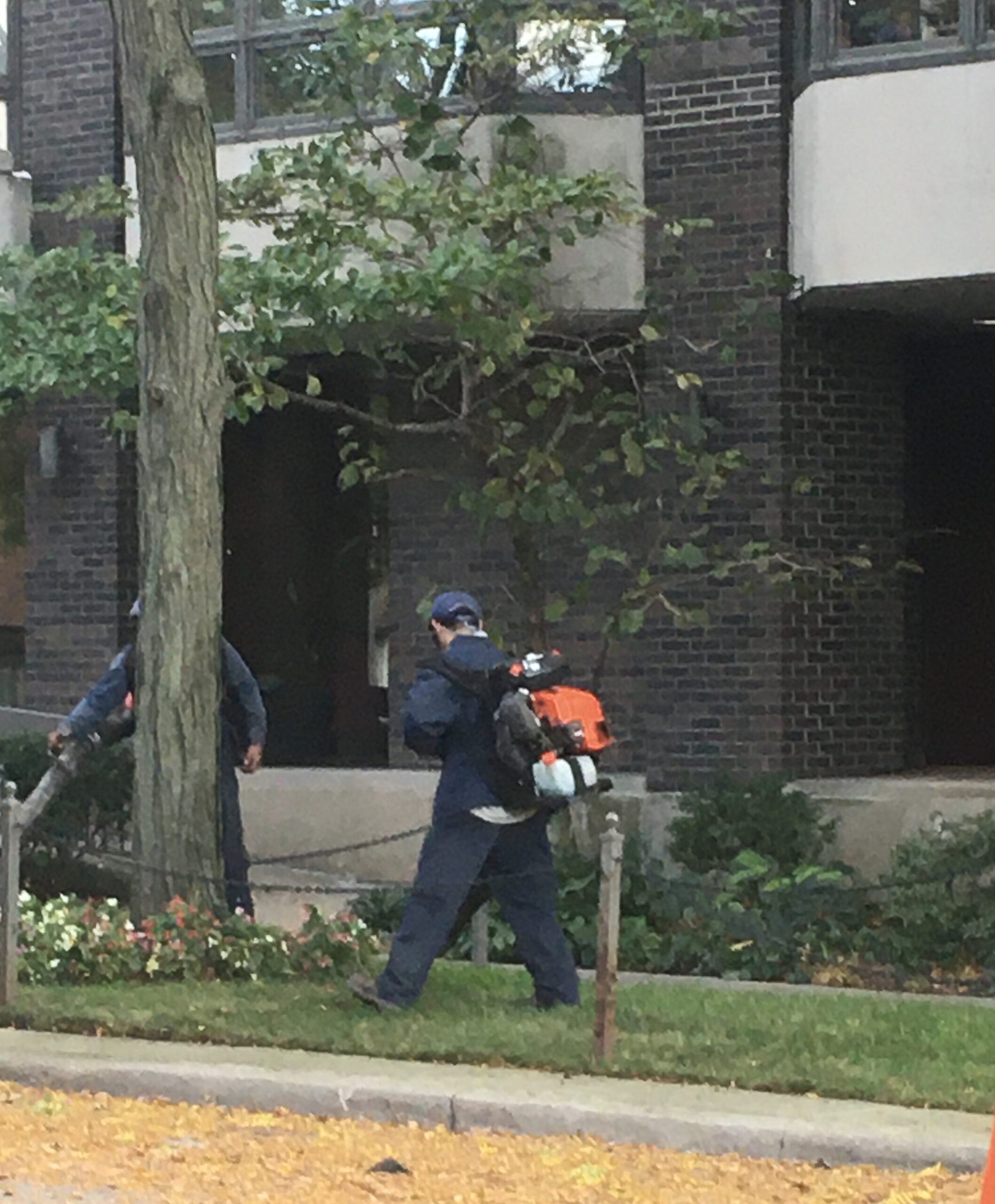By Bob Seidenberg
After a tumultuous city Administration and Public Works Committee meeting earlier this month, the board members of the Artists Book House “looked at each other and said, ‘We need a board meeting,’ ” explained Audrey Niffenegger, the group’s founder and president in an interview last week.
Two days later, the group told the city via Council Member Eleanor Revelle, in whose Seventh Ward the mansion and grounds are located, that it not be continuing with the project to turn the Harley Clarke mansion into a book and literary center. Instead, the group said it would move to a more modest location.
“The [Jan. 9] meeting brought home to us very vividly that our lease with the city was built on quicksand,”Niffenegger said.
Artists Book House members felt they could not move forward after requests the board made for new fundraising benchmarks were brushed over at a city meeting for the second time in three months, said Niffenegger. And the discussion became mired in their relationship with a local landscaping group.
In the interview, Niffenegger said the board members came to their decision after the Jan. 9 meeting where council members spoke about bringing in a mediator to attempt to resolve a dispute between Artists Book House and the Jens Jensen Gardens in Evanston, a nonprofit group that tends the mansion’s gardens, yet had no legal standing on the property lease.
Coming out of the pandemic
Niffenegger, author of the best-selling novel The Time Traveler’s Wife and an Evanston Township High School graduate, said she had been coming to the mansion since age 14, when it housed the Evanston Art Center. She said she hoped to replicate the work she had done at the Center for Book and Paper Arts formerly housed at Columbia College Chicago, considered a leader in the literary arts field before it closed in 2019.
The previous city council selected the group’s proposal over three others after Artists Book House received the highest score on the city staff’s grading system.
The 40-year-lease for the mansion at 2603 Sheridan Rd., which had been vacant since 2015, was awarded in May 2021, already more than a year into the Covid pandemic.
“We immediately understood, before it [the project] even started to happen that the greatest need for philanthropy was going to be in the area of keeping people fed, housed, treating the sick – you know, the most urgent basic humanitarian need.”
She said what might not have been accounted for was its lingering effect. On top of that came a war in Ukraine raising fuel prices and triggering inflation.
“That just means people conserve their cash…a sensible thing,” she said. “But it doesn’t help us get us to where we need to go.”
She told the RoundTable: “The way arts organizations raise money is by bringing people together. You have parties, you have art auctions, you gather. We couldn’t do that. … It also diverted money that in rosier times might have come our way as an arts organization.”
The group kept the city updated on its fundraising progress in quarterly reports. In June, officials suggested that the group draw up revised benchmarks as part of an amended lease, Niffenegger said.

Artists Book House original benchmarks, written into the lease, called for $2 million to be paid in May 2022. That was to be revised to $1 million by the end of 2022, a goal that was met via end of year pledges. “It was a stretch,” Niffenegger admitted.
The revisions also included slightly lower, but still ambitious, fundraising benchmarks – $2 million by the end of 2023, compared with $4 million by May 2023 in the original lease; then $3 million per year after that until the mansion’s renovation was completed and open to the public in 2026.
The group was scheduled to present the goal changes at the Oct. 10 city council meeting last year. “We weren’t expecting that it would be controversial,” Niffenegger said. “The idea was to make our lease accord better with our reality and give us a fighting chance to do what we hoped to do.”
An hour or so before the meeting, though, Niffenegger said, her group learned that the Jens Jensen Gardens group had asked First Ward Council member Clare Kelly to tie the fundraising benchmarks approval to a more official status for Jens Jensen Gardens in tending the mansion’s grounds.
During the council discussion, Council Member Revelle spoke in favor of the vote to revise the fundraising goals.
But First Ward Council Member Clare Kelly moved to hold the item, referring to Smith’s remarks. Before being elected to the council, Kelly was a member of Evanston Community Lakehouse and Gardens, a group that plans to team up with the Jens Jensen group if it won the lease.
“I think it’s really important that we get this lease right,” Kelly said. “I think it was understood from the beginning that the coach house should be managed by Jens Jensen Gardens, as well as the landscaping. This is a legal document, right? We shouldn’t kind of pass this down the road to be amended.”
But even the issues around all of this remain murky. An April 21, 2020, memo from City Management Analyst Tasheik Kerr noted that Artists Book House would refurbish the coach house.
The memo refers to a sublease between Artists Book House and Jens Jensen, reading: “As it pertains to the renovation of the Coach House, ABH [Artists Book House] plans to enter into a sublease with Jens Jensen Gardens in Evanston. The Coach House will be the home for this garden group. ABH would remain responsible for ensuring the renovations under the lease agreement.” Yet that sublease never materialized.
At the Oct. 10 meeting, Kelly proposed that the council hold any action on the issue, sending it to the Administration and Public Works Committee to develop separate leases for the mansion and its grounds.
Issue offers a ‘leveraging point’
Revelle said while she agreed with Kelly about examining separate leases, she thought it important to move forward with Artists Book House request as the benchmarking targets were a completely different issue.
Responded Kelly, “This is the way leases work, and this is, you know, our leverage point. This is so important to our community and Jens Jensen President Charles Smith, who has been working hard on it. I think this is the moment to use this opportunity to get the lease right and to separate those leases.”
Kelly’s use of the word, “leverage,” prompted Niffenegger to address the council a second time at the meeting.
“I don’t see why the revision of our fundraising targets in the phasing construction should be used as leverage to apparently try to induce me to do something that I might not otherwise do,” she said.
Niffenegger said there was a lot of confusion at the Oct. 10 and Jan. 9 meetings about the Jens Jensen group’s role in relation to Artists Book House use of the property.
There were “people who thought that Charles’ group somehow has some kind of legal right to the property,” she said. “They don’t have a sublease. They don’t have a lease. They don’t have a memorandum of understanding. They don’t have a license. They are at the moment, not there by any reason other than that, Artists Book House said you can be there.”
At the Oct. 10 meeting and in a follow-up interview, Kelly conceded that “leverage” might have been the wrong word. But her point was to make the arrangement work, she said, “and this was our moment to do that, that’s our responsibility as an elected official.”
At no point, she noted, did anyone express unwillingness to approve the benchmark changes Artists Book House was seeking. As for her advocacy for the Jens Jensen group at the council meeting and later chairing the Administration and Public Works Committee, Kelly said, “I’m deeply immersed in this community, everybody knows that. There’s very little I haven’t been involved with.”
Kelly said she was supportive of Artists Book House’s efforts and wanted to see the group succeed. But she said she felt both groups were integral to each other’s success.
Keys to the coach house
Artists Book House members have been working with Smith almost since the Harley Clarke mansion lease was awarded.
“When we were given keys by the city, one of the first things we did was I handed a key to the coach house to Charles Smith,” Niffenegger said. “And I said, ‘Now, let’s negotiate a sublease for you guys,” —something Artists Book House pursued for eight months, she said. And when the sublease negotiations failed, Niffenegger said she offered Smith a spot on the Artists Book House board of directors.
“We knew that Charles had for years wanted to restore these gardens. It’s a great passion of his and I have respect for that. As one artist to another, I know what it’s like to make it your mission to share to do something creative,” said Niffenegger.
“And so I think when another bunch of people might have just given up, we kept coming back and trying various things. But we deadlocked because there were things that they wouldn’t budge on, that we couldn’t give.’’
At the Artists Book House board meeting in December, the board voted to have Smith’s group give back the key to the coach house and leave, Niffenegger said.
“The reason for this was they had taken the discussion outside of our family circle – you know, we were no longer talking directly with each other,” she said in the interview. “They were trying to speak to us through the medium of the city council and make demands that way.
“And so I wrote a letter to Charles Smith and Bill Brown [a Jens Jensen board member]. At that point we thought, ‘OK, we can’t really pretend that this is ever going to work out with them, and so I asked them for the key back.”
She said neither of the two men responded. “But suddenly the matter of our benchmarks was on the agenda of the Administration and Public Works Committee meeting.”
More than a garden variety dispute
Smith, for his part, never answered answer directly whether the key had been returned, but said he was disappointed at Artists Book House’s decision to pull out of the process. In fact, he said he called Niffenegger the day after the turbulent Jan. 9 meeting to express respect for her and the program.
“I think Audrey herself was incredibly brave for taking it on in the beginning,” he said in a Jan. 23 interview with the RoundTable. “I think the relationship we started with would have been a good thing for the community had it gone on.”
Part of the dispute, he said, revolved over whether Artists Book House had the right to make alterations to construct things – terraces, walks, other things – that were incompatible with Jens Jensen’s design principles, he said.
He confirmed that Jens Jensen did go outside the Artists Book House after its board voted to change to the lease concerning the grounds. The conversation then switched, he said, to city council members and staff “how that would happen,” he said.
Before that Jan. 9 meeting, Niffenegger said that her group spoke to some council members who suggested issuing a request for proposal, or RFP, inviting firms to bid on the landscaping and restoration of the coach house.
“We would have gladly acquiesced to that,” she said. “We believe that an RFP process was very beneficial to us. It would have helped us get our ducks in a row, helped us understand what we were trying to do.
“Of course, Charles and his group would have been very welcome to participate in an RFP. And I’m sure they would have had an advantage because Charles has been studying the property and has had years to think about this.”
But at the Jan. 9 meeting, the discussion was all about bringing in a mediator.
Chairing the meeting, Kelly at several points in the discussion maintained the committee’s direction to the mediator should include a directive “that we’ve clearly stated that we feel the Jensen group should have the Jens Jensen gardens, the coach house, including the grotto, which is a fundamental.” She said the mediator could determine how far out from the mansion the perimeter lines would be drawn.
Baby with the bathwater
In discussion, new Second Ward Council member Krissie Harris was among those who expressed difficulty with that approach, noting, “There is no need for mediation if we’re telling them what the space is.”
She drew a comparison with the biblical story where King Solomon orders the splitting of a baby to resolve a dispute over whose child it is. “That’s clearly where I feel we are right now – that we cannot come to a consensus on who belongs to the baby, and we are about to split the baby. And I have a problem with that.”
Meanwhile, Niffenegger noted: “The matter of our benchmarks wasn’t really discussed – someone called out, ‘What about the benchmarks?’ and Chairperson Kelly, sort of waved her head and said, ‘Oh, you know, we’ll do that,’ or something. I don’t even remember her exact words. That was the total extent of that discussion.
“But the upshot of it, as far as we can understand – and I am not even sure that the committee itself completely understood what they had just done – is that our benchmark and construction phases revision is completely dependent on going through mediation with Charles Smith and his group.
“Given the way fundraising has been going, even if we managed to get them to approve our revised benchmarks, I think we would just end up before them again very shortly,” she said.
“And if our benchmarks will repeatedly be used as a blunt instrument to get us to do things that seem very ill-advised, then it would be folly for us to start investing real money in the property.
“I’m disappointed that it worked out this way, because our intent was to be good partners with them,” she said about the fallout with the Jens Jensen group. “And, you know, we tried to set up the lease in such a way that once all of us who are presently wrangling are gone – however many years that may be – that the people who come after us could work within the parameters of this arrangement.
“I mean, you don’t make a long contract like that for yourselves necessarily. It’s got to endure without creating strife. But there was so much strife already that entering into a long contract seemed out of the question.”




